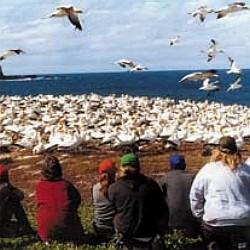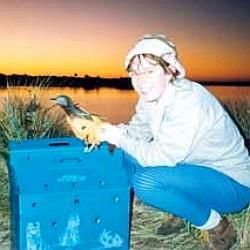North American Australearners
Published on 09 January, 2003
About 1200 study abroad students who arranged their study-abroad options through Denver-based AustraLearn, a company associated with Central Queensland University, have a unique opportunity to camp-out for three days to monitor wildlife populations, hike, and survey the bush and coastal waters.
 North American university students start arriving at universities across Australia this week. While they may not leave the land down-under with degrees in crocodile hunting, they will leave with an up-close and personal Outback education experience that takes them nose-to-nose with bandicoots and wallabies, even emus. They will contribute, hands-on, to projects in communities across Australia that are committed to the health and sustainability of wildlife.
North American university students start arriving at universities across Australia this week. While they may not leave the land down-under with degrees in crocodile hunting, they will leave with an up-close and personal Outback education experience that takes them nose-to-nose with bandicoots and wallabies, even emus. They will contribute, hands-on, to projects in communities across Australia that are committed to the health and sustainability of wildlife.
“It’s breath-taking, more than a bus-tour could ever provide,” says Cynthia Banks, who has worked with American and Canadian students in Australia for more than 13 years.
Students who attend the University of Queensland, for example, will work in the dune areas of Byron Bay – the most easterly point of Australia’s mainland – where dolphins congregate. In Rockhampton, visiting co-eds will be part of a wallaby recovery program. Students in New South Wales can visit Bowen Island to undertake penguin restoration projects.
 To participate in a project, students must be a university student in the United States and enrolled at an Australian or New Zealand university study-abroad program through AustraLearn.
To participate in a project, students must be a university student in the United States and enrolled at an Australian or New Zealand university study-abroad program through AustraLearn.
“Students always take wonderful experiences of Australia with them. This is a way for them to leave their imprint on the land and give back something,” said Banks.
Since 1989, AustraLearn has been sending students to study abroad in Australia and New Zealand. Students enrol in summer programs, undertake custom-designed internships and earn their undergraduate or graduate degree at one of 23 different universities in the two countries.

